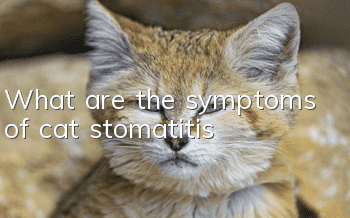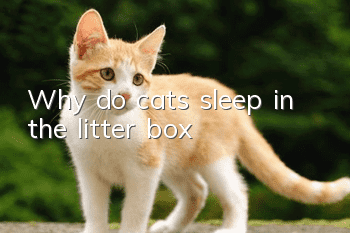What are the symptoms of cat stomatitis?

Cats with stomatitis in cats will exhale foul-smelling gas, drool severely, and secrete white foam from the corners of their mouths. Severe cases of vesicular stomatitis will occur in cats, which means blisters of varying sizes appear on the oral mucosa. In more severe cases, the cat's oral mucosa will appear rot, necrosis, erosion, half-protruding tongue, hoarse voice, etc.
Precautions for cats with stomatitis:
1. Pay attention to diet: When a cat suffers from stomatitis, do not feed the cat cat food to avoid dry and hard food. Food will make it difficult for cats to chew and cause irritation to the mouth. You can feed canned liquid food that is easy for digestion or soak soft food in goat milk powder to reduce the pain of oral ulcers caused by dry and hard food. After the cat eats, you can brush the cat's teeth properly to keep the oral environment hygienic, and you can also use some state-of-the-art mouthwash to help the cat rinse its mouth.
2. Clean the mouth well: Cats suffering from stomatitis will not only drool but also have bad breath. Therefore, when a cat has stomatitis, the owner should help the cat deal with the mouth in time. inflammatory condition. The owner can first stabilize the cat, and then spray some mouth spray on the area where the cat has stomatitis to clean the mouth. Then you can mix some pet food into the cat's food, and then feed it with some pet food to help the cat restore its oral health.
3. Supplement vitamin B: In most cases, cats are prone to stomatitis due to insufficient vitamin intake in the body. Pet owners want their cats to get better as soon as possible, but it is difficult to just adjust their usual diet. Pet owners can give their cats home vitamin B to help the cat supplement the vitamin B needed by the body and reduce the trouble of stomatitis.
- How to trim Chinchilla cat nails?
- Why does the little kitten keep meowing?
- How to train a cat to catch mice? Corrective training for cats!
- What preparations need to be made before raising a cat? A must-read for novice cat owners!
- Can kittens eat ham?
- How long do Burmese cats generally live?
- What medicine is best for external deworming of cats?
- What to do if cat ringworm grows on its paws
- Is the Turkish Van cat easy to raise? Turkish Van cat pictures | price |
- How much weight does a Ragdoll cat normally weigh in three months?



